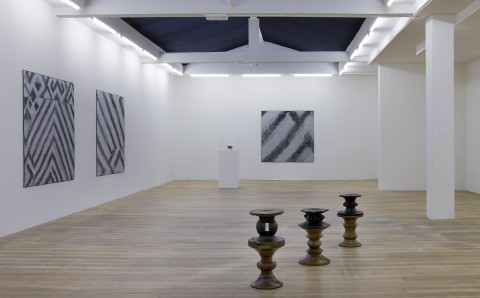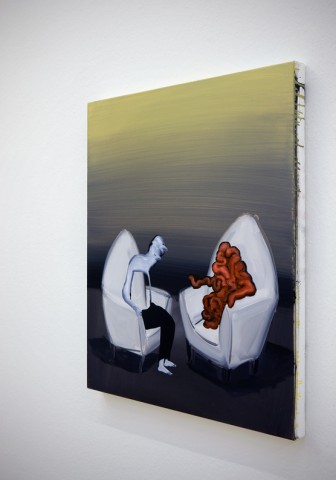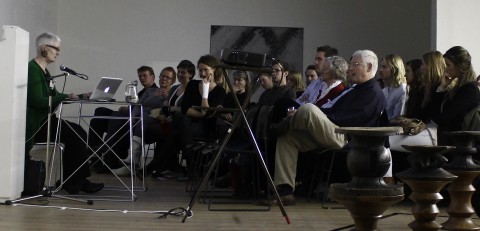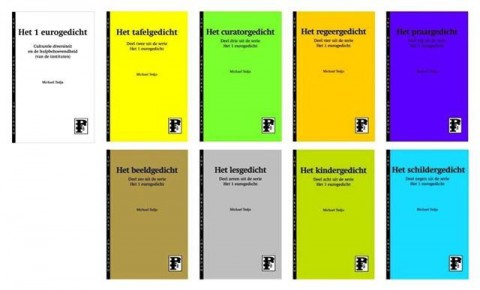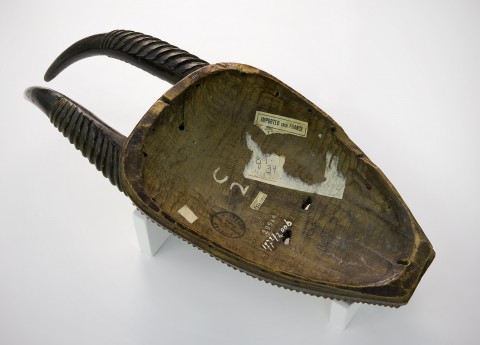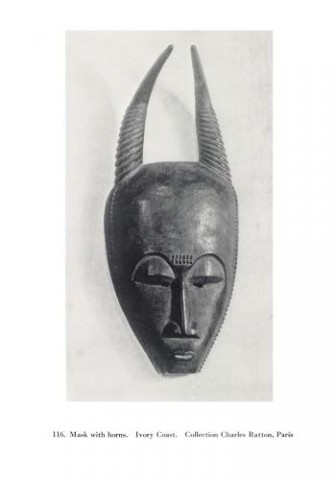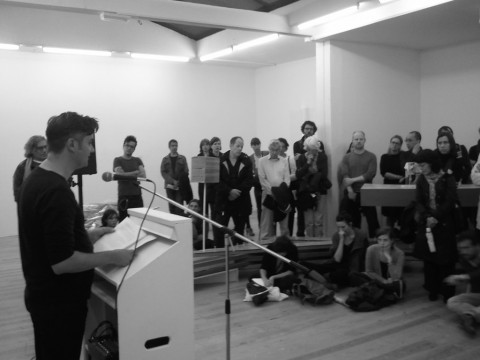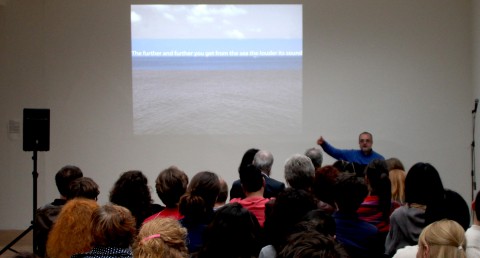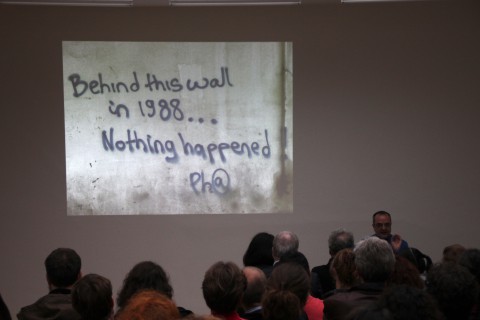Author Archives: Tessa Verheul
While Project ‘1975’ researches the relation between international contemporary art and the postcolonial discourse, Former West reflects upon the changes introduced to the world (and thus to the so-called West) by the political, cultural, artistic, and economic events of 1989.
The fall of the Berlin wall in 1989 represented the end of the Cold War between the communist East and the capitalist West, and represented the end of an era (or even ‘the end of history’ in the words of Francis Fukuyama). The term “former West,” the unofficial counterpart to the widely used “former East,” refers to this division. How have the events in 1989 influenced the dichotomy? What has changed since then? And what is it that we have in mind when we now speak of the “East” and the “West?”
These are the questions initiator Maria Hlavajova (artistic director of BAK, basis voor actuele kunst, Utrecht) and co-organisor Charles Esche (director Van Abbemuseum, Eindhoven) formulated during the introduction of the first research congress in 2009.
More
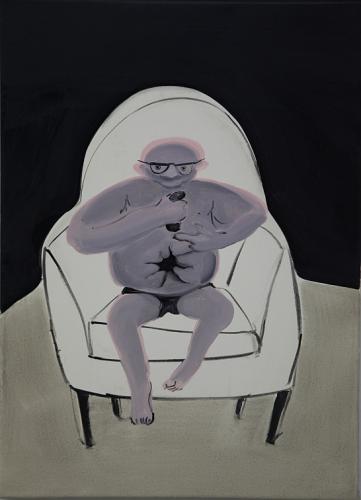
Tala Madani’s work can be characterized by an illustrative stroke of the brush, moving back and forth across the borderline between the clear-cut line of comic strips and an expressionist use of color. Her compositions situate male figures in absurd scenes touching upon the non-rational aspects of human behavior. Against the background of intimate, domestic or dreamlike environments, the figures expose themselves freely and easily to observers. Apparently obsessed, they are completely immersed in the demonic scope of their activities.
Through taking the idea of the demonic obsession as a point of departure for the exhibition ‘The Jinn’, Madani has added a mythological element to her artistic practice. While a fascination for the non-rational has always driven her artistic production, the explicit involvement with Islamic tradition and Arab folklore enriches her practice in a fresh and intriguing way.
Click here to read more about the exhibition ‘Tala Madani – The Jinn’.
Click here to read an interview with Tala Madani about ‘The Jinn’.
The exhibition ‘Tala Madani – The Jinn’ opens on Saturday 10 December. ‘ChitChat’ (2007) is the first animation Madani produced, and will be part of the exhibition at Stedelijk Museum Bureau Amsterdam. Watch ‘ChitChat’ online as a preview to the exhibition and read an interview with Tala Madani about her work, ‘The Jinn’ and her current inspirations below.
On October 25, Stedelijk Museum Bureau Amsterdam hosted two book launches of two publications that each focuses on the postcolonial discourse.
The publication If you want, we’ll travel to the moon together is initiated by a group of Art History students of the University of Amsterdam. The book presents a collection of essays that students wrote during the (Dutch) research seminars ‘Kunst en Globalisering’, directed by dr. Marga van Mechelen. During the research seminars, the students focused on the question how artists have been responding to globalism during the past fourty years. The publication includes essays on Rinke Nijburg, Mark Lombardi, Yael Bartana, NSK-State en Transnational Republic, Dan Perjovschi, Banksy, Ai Weiwei, Dinh Q. Lê, Aernout Mik, Sharmila Samant, Renzo Martens and The Action Mill. Prof. dr. Mieke Bal provided an introductory lecture during the book launch, in which she reflected on the topic art and globalism.
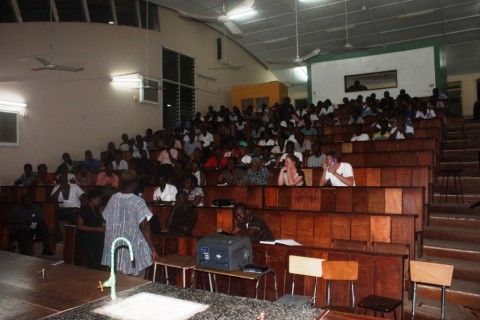
Kari-kacha Seid'ou, art teacher, introduces Bouwhuis and Winking to the students of the College of Art / KNUST, Kumasi, Ghana.
In the week of October 27th, Jelle Bouwhuis and Kerstin Winking travelled to Ghana to meet with artists, as part of the exchange programme organised by SMBA and the Nubuke foundation in Accra. After their visit to Accra, they travelled to Elmina, Takoradi and Kumasi.
In Takoradi they met painter Rikki Wamega-Kwaku, who they requested to write a contribution for the next SMBA Newsletter. The College of Art of the Kwame Nkumrah University of Science & Technology invited Bouwhuis and Winking to visit Kumasi and to give a lecture on SMBA and contemporary curating. Furthermore several studio visits were organised to meet with several artists and art students.
Besides Ghana, Bouwhuis and Winking also travelled to Bamako (Mali), to attend the opening of the Bamako Encounters, the Biennale for African photography. One of the promising artists they met in Mali, Abdoulaye Konaté, might be part of a future exposition at SMBA.
Click here to read Bouwhuis’ review on the Bamako Encounters Biennale for Nafas Art Magazine.
During the Amsterdam Museum Night (5 november), artist Michael Tedja (1971) will present a lecture on art, identity politics and schisms in Stedelijk Museum Bureau Amsterdam. Central is the self-cleansing standard of Dutch art appreciation, which from Tedja’s perspective breathes a virtually 19th century colonial mentality: “The handling, the way in which you handle your own colour and the many colours around you are a colour study. I see it as an artist project that develops by mixing… I do not like Reformed art. Piet Mondriaan didn’t want people to paint diagonals; it had to be vertical and horizontal; the narrow mindedness….”.
Tedja is a painter, writer, poet, publisher and a curator. His art work has been exhibited nationally and internationally. Tedja’s newest book is called The auto poem and consists of nine parts. Each part comprises of 48 pages. His lecture at SMBA is part 7: The teaching poem, of which a part has appeared earlier, in the Dutch monthly ‘Hollands Maandblad’. Tedja wrote The auto poem in the framework of his BijlmAIR residency organized by CBK Zuidoost and Stedelijk Museum Bureau Amsterdam.
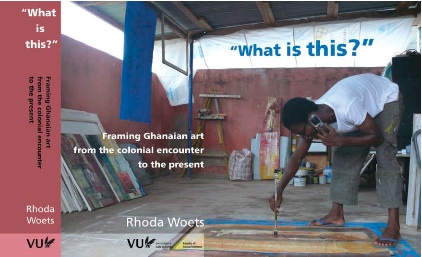
Cover of Rhoda Woets PhD thesis 'What is This? Framing Ghanaian art from the colonial encounter to the present'.
On September 28, the Vrije Universiteit of Amsterdam’s department of Social and Cultural Anthropology organized a seminar entitled ‘(Re)contextualising Art: Anthropology, Art History and the Museum’. During this afternoon anthropologists, art historians and curators gathered to discuss the current status of globalization and contemporary art.
Issues that were put up for discussion are the modes of evaluation to judge, acquire and display art from “outside.” What tools and criteria should curators use? Is an intimate knowledge of the social and cultural settings in which artists operate essential in valuing their work, as anthropologists tend to argue? A growing number of anthropologists study contemporary art(ists) but what have their contributions been to the formation of new art historical discourses? In short: how can anthropologists, art historians and curators come to a more fruitful cooperation and exchange?
Both art historian Gabriele Minelli and art historian Madelon van Schie wrote a report about the seminar. Gabriele Minelli’s report is published below. Click here to read Madelon van Schie’s report in Dutch.
Clémentine Deliss is the author of the fifth Project 1975 essay ‘Stored Code. Remediating Collections in a Post-ethnographic Museum.’ In this essay Deliss investigates what kind of framework might be best suited to present a world-cultures museum’s collection in the twenty-first century.
How can we translate the ‘ethnographic’ collections of world-cultures museums into the Post-ethnographic discourse? Deliss argues for a remediation of the world-cultures collections. To remediate means to bring about a change of medium, to experiment with alternative ways of describing, interpreting and displaying the objects in the collection. While analysing the Weltkulturen Museum in Frankfurt, Deliss states that to re-think the ethnographic collection means to engage with that necessary mix of discomfort, doubt, and melancholia in order to translate these objects to a contemporary context and gently build additional interpretations onto their existing set of references. For this process to work, fieldwork has to take place within the museum itself and no longer on journeys to distant lands. Hereby the museum becomes a space of visual inquiry and production. Download Newsletter 124 here to read Clémentine Deliss’ essay.
Clémentine Deliss is curator and director of the Weltkulturen Museum, Frankfurt. She studied contemporary art and social anthropology in Vienna, London and Paris and holds a PhD from the School of Oriental and African Studies, University of London on 1920s French anthropology and dissident surrealism. Between 1992 and 1995 she functioned as artistic director of Africa95, a contemporary arts festival coordinated with the Royal Academy of Arts, London, and 60 UK institutions. From 1999 until 2000, Deliss was guest Professor at the Stadelschule, Frankfurt. She is producer and publisher of Metronome and worked as director of the research institute “Future Academy” at the Edinburgh College of Art.
Vincent Vulsma‘s interests are directed toward the effects of shifting cultural objects across different social and historical contexts, investigating the role that artists and other art specialists have in these processes of value-making. He brings together objects and patterns taken from their contexts in ethnographic collections and the canons of modernist design and photography, deliberately moving back and forth along the lines between what is classified as commodity, art or ethnographic object.
The central object of ‘A Sign of Autumn’ in the SMBA is a Baulé mask, a loan from the Tropenmuseum in Amsterdam. The mask came to Vulsma’s attention because of its rich acquisition and exhibition history. Other elements of the exhibition are a series of large-scale Jacquard-woven reproductions of Kuba-textiles and a series of assemblages, combining a selection of stools made in the Congo (probably around the 1930s) with a set of Ray Eames’ Walnut Stools, which were designed in 1960 and which are still industrially produced and commercially distributed today.
Together with the artist Matthijs de Bruijne, Stedelijk Museum Bureau Amsterdam has organised an evening with presentations by artists and groups focusing on the effort to create greater social solidarity. One of the points of departure for this evening is the lecture by Joost de Bloois, given at the opening of the exhibition ‘Informality’ in the Stedelijk Museum Bureau Amsterdam, about precarity, art and political activism.
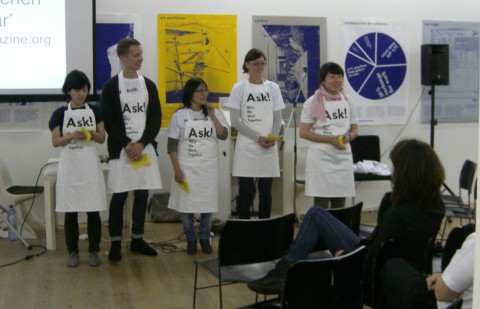
Performance Actie Schone Kunsten
Overview of the exhibition ‘Informality’.
With work by Domestic Workers Union / Matthijs de Bruijne / Detour, Doug Fishbone, Kaleb de Groot, Jose Antonio Vega Macotela, Marc Roig Blesa, Rogier Delfos, Senam Okudzeto.
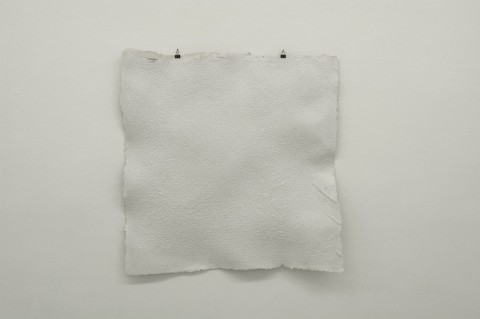
Kaleb de Groot, Cardboard, handmade, from ‘Jan who saw it all’ (Barbara Visser, 2004), 2011.
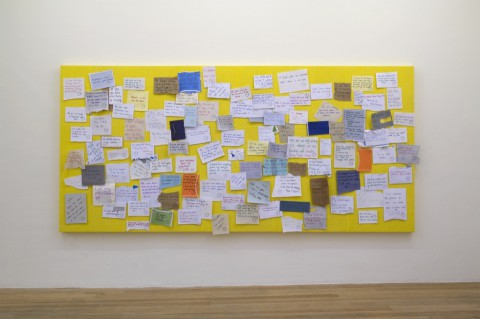
Domestic Workers Nederland (with Matthijs de Bruijne and Detour), You are so nice! Could you work two more hours today?, 2011.
More
During the opening of the exhibition ‘Informality’, Dr. Joost de Bloois, lecturer at the University of Amsterdam, department of Literary and Cultural Studies, gave a presentation about the notion of “precarity”. The concept of “precarity”, which is best described as ‘the structural uncertainty of livelihood and income’, serves as a rallying cry for a great number of contemporary protest movements (from the French anti-CPE protests to the Spanish Indignados, via the Greek social movement and recent student protests in Italy and Germany). Equally, “precarity” has become a key notion in both critical theory and artistic practice today. In his lecture Joost de Bloois unpacked the different meanings and the ambiguities of the notion of “precarity” within political and artistic practices and critical theory.
Here you can read the full text of his presentation ‘Making Ends Meet: Precarity, Art and Political Activism’.
Tate and Guaranty Trust Bank announced an important new partnership which will broaden Tate’s international reach to Africa, provide a platform for African artists to be seen by audiences world-wide and heighten awareness of the impact of African art on modern and contemporary practice. The legacy and current influence of art produced in areas outside Europe and North America has been a focus for Tate in recent years and this presents an unprecedented opportunity to examine Africa’s role at the heart of global artistic developments. The partnership will involve the creation of a dedicated curatorial post at Tate Modern to focus on African art, an Acquisition Fund to enable the Gallery to enhance its holdings of work by African artists and an annual project.
Chris Dercon, Director Tate Modern said:
“This important partnership between Tate and GTB marks the recognition of the significance of modern and contemporary art in Africa. We now have an unprecedented opportunity to work with colleagues in the region, with energy, curiosity and eagerness, to define new parameters in art. This is the beginning of being able to give African art the focus it deserves with audiences around the world.“
Click here to read the press release on the website of Tate Modern
The exhibition ‘Informality’ arises from the increasing attention being given to the role of banks in our economy, and the interest in alternatives to their role. It is also a first reflection on the role of art and artists in an atmosphere of crisis and cuts in cultural funding. The exhibition focuses on informal economy, that part of commercial and the service sector that operates outside of the circuit of formal financial transactions, and examines this phenomenon from the perspective of art, involving certain informal aspects of the art world itself in doing so, including the precarious position of the artist in society.
With work by Domestic Workers Union (Matthijs de Bruijne and Detour), Doug Fishbone, Kaleb de Groot, Jose Antonio Vega Macotela, Marc Roig Blesa, Rogier Delfos, Senam Okudzeto.
Click here to read more about ‘Informality’ and to download the Newsletter.
On June 25th, architect, writer and artist Tony Chakar (Beirut, 1968) gave a lecture about the influence of the war on the everyday life in Lebanon. The complex history of the country, between 1975 and 1990 there was a civil war in Lebanon, and since 2006 there were several conflicts with Israel, deeply influenced the public space and the manner of dealing with language and culture.
Overview of the exhibition ‘Mounira Al Solh & Bassam Ramlawi’.
With work by Mounira Al Solh, Bassam Ramlawi and René Daniels.
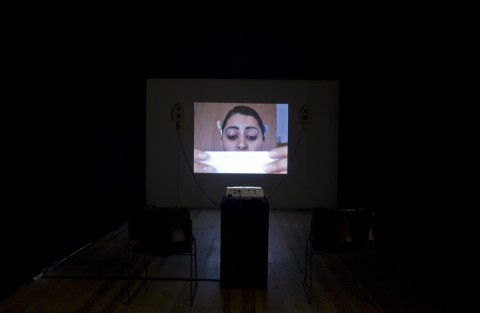
Mounira Al Solh, Double Burger and Two Metamorphoses: a proposal for a Dutch Cat, a Dutch Dog, a Dutch Goat, and finally a Dutch Camel, 2011.
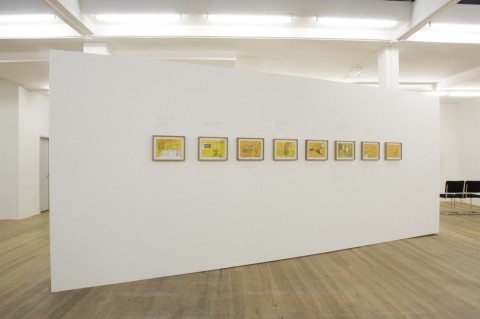
Bassam Ramlawi, From Waiting Blue to Lingering Yellow (or vice versa), 2010.

